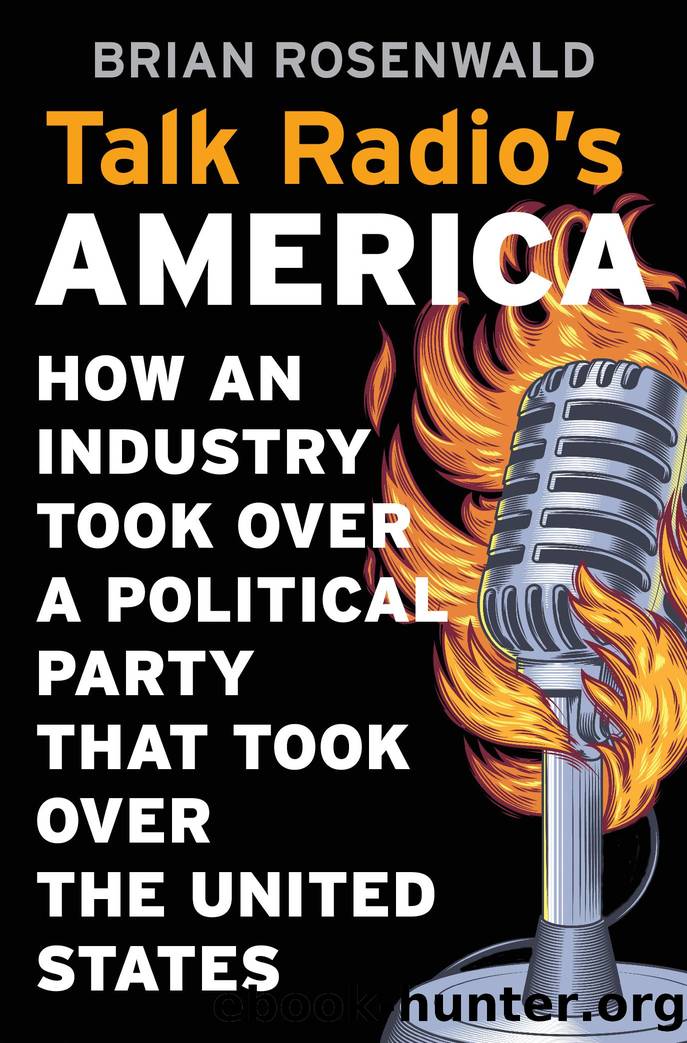Talk Radios America : How an Industry Took over a Political Party That Took over the United States (9780674243231) by Rosenwald Brian

Author:Rosenwald, Brian
Language: eng
Format: epub
Publisher: Harvard Univ Pr
When Scozzafava withdrew from the race and endorsed Owens, the Democrat, Limbaugh responded with glee. Another moderate had been exposed as an unprincipled liberal. “Dede Scozzafava has just delivered a teachable moment for those who lack a keen sense of the obvious,” he told listeners. “RINOs cannot be trusted.… They aren’t principled. You vote ’em into office and you’re going to get cap and tax, you’re going to get some version of Obamacare, you’re going to get tax increases, you’re going to get TARP bailouts, you’re gonna get amnesty.”17 Owens defeated Hoffman in the election, but again, this mattered less than imposing talk radio–style conservatism on the GOP.
Although talk radio scorned moderate Republicans in the Tea Party era, there were moments when their goals happened to overlap. Another special election, with the highest of stakes, found hosts boosting a moderate Republican: Scott Brown, who was running against Massachusetts Attorney General Martha Coakley in a January 2010 election for the Senate seat previously occupied by the late Ted Kennedy. Talkers had a large impact on the race, thanks in part to more robust Web tools and social media, which made talk radio an even greater financial powerhouse for Republicans seeking campaign contributions.
Conservative hosts had several reasons to pull for Brown. If Brown won Democrats would be deprived of the sixty Senate votes they needed to pass a final version of the Affordable Care Act—or any other legislation—without concessions to secure at least one Republican vote. At the time, both houses had passed versions of the health care legislation, but they still needed to reconcile the two bills. The race also carried deep symbolic significance because the seat had been in the Kennedy family for all but twenty-six months dating back to John F. Kennedy’s election in 1952. And while hosts might have opposed Brown’s moderation on many cultural issues, he was at least a solid fiscal conservative.18
As the race progressed and tightened, it catapulted into hosts’ field of view. Brown would go on shows, mention his website, and watch the traffic and donation numbers spike.19 Accordingly, his advisers increased his bookings on conservative media. Talk radio, in particular, drove donations. Staffers would discover clusters of donations from unexpected zip codes at odd times of day—say from Boise at 10 o’clock at night. It turned out that the race had been discussed on talk programs airing on tape delay in the relevant markets.20 A mention by a national talker could produce up to $20,000 in donations. In the week between Christmas and New Year’s, mentions by Ingraham and Herman Cain, filling in for Hannity, brought in hundreds of donations apiece.21
Brown’s campaign came up with a “money bomb”—a multifaceted effort that included a media blitz designed to generate a burst of donations on January 11, eight days before the election. They hyped the money bomb on social media and other sites. They also built a site that took pledges and, on the designated day, reminded donors to pay up. Also on the appointed day, Brown appeared with Ingraham in the morning and Hannity in the afternoon.
Download
This site does not store any files on its server. We only index and link to content provided by other sites. Please contact the content providers to delete copyright contents if any and email us, we'll remove relevant links or contents immediately.
| Anarchism | Communism & Socialism |
| Conservatism & Liberalism | Democracy |
| Fascism | Libertarianism |
| Nationalism | Radicalism |
| Utopian |
The Secret History by Donna Tartt(16623)
The Social Justice Warrior Handbook by Lisa De Pasquale(11489)
Thirteen Reasons Why by Jay Asher(7788)
This Is How You Lose Her by Junot Diaz(5771)
Weapons of Math Destruction by Cathy O'Neil(5036)
Zero to One by Peter Thiel(4824)
The Myth of the Strong Leader by Archie Brown(4789)
Promise Me, Dad by Joe Biden(4447)
Beartown by Fredrik Backman(4417)
Stone's Rules by Roger Stone(4415)
How Democracies Die by Steven Levitsky & Daniel Ziblatt(4398)
The Fire Next Time by James Baldwin(4342)
100 Deadly Skills by Clint Emerson(4076)
A Higher Loyalty: Truth, Lies, and Leadership by James Comey(4032)
Rise and Kill First by Ronen Bergman(4012)
The David Icke Guide to the Global Conspiracy (and how to end it) by David Icke(3881)
The Farm by Tom Rob Smith(3872)
Secrecy World by Jake Bernstein(3782)
The Doomsday Machine by Daniel Ellsberg(3730)
